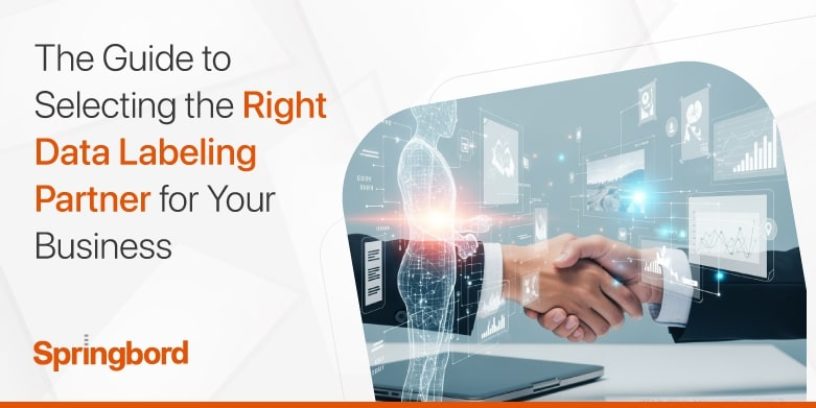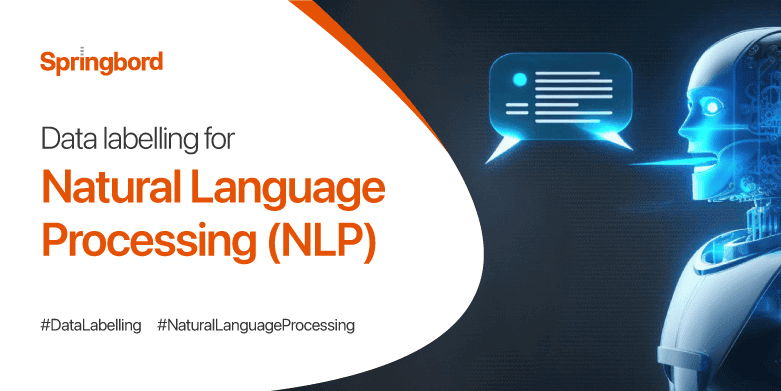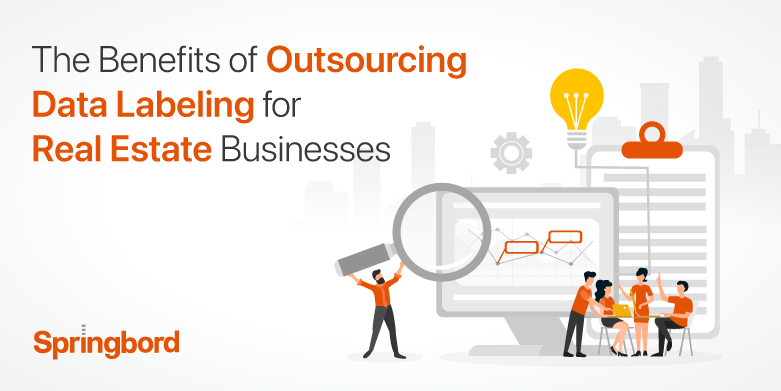 Read time 6 min
Read time 6 minIntroduction
The efficacy of any AI/ML model depends not only on algorithms but also on the quality, precision, and consistency of the training data. As enterprises increasingly rely on AI for automation, decision-making, and customer experience, precise data labeling becomes an essential component. Labeled datasets serve as the basis for developing computer vision systems, natural language models, or extensive classification tools. Like any foundation, the pipeline as a whole may be at risk from cracks brought on by inconsistent annotations, scalability issues, or noncompliance.
When choosing a data labeling partner, operational scalability, quality assurance procedures, domain knowledge, and compliance alignment are the factors that really count. In this blog, we simplify the process and focus on these crucial factors. These factors help you scale your AI models responsibly and cost-effectively while improving their accuracy.
At Springbord, our approach is built on solving these exact challenges. With specialized teams, domain-aligned workflows, and end-to-end support, we deliver data labeling solutions that enhance model performance and mitigate business risk.
The Repercussions of Poor Data Labeling
Labeling data incorrectly can greatly lower the performance of an AI model. Studies have shown that label errors can lead to substantial declines in classification accuracy, necessitating more complex models and complicating the learning process. For instance, research indicates that even a 20% error rate in labels can render a dataset ineffective for training purposes.
Beyond performance issues, inaccurate data labeling poses serious compliance risks. Moreover, the inability to scale labeling operations efficiently can hinder the deployment of AI solutions, delaying time-to-market and increasing costs.
How to Choose the Right Data Labeling Partner
Given these challenges, selecting the appropriate provider for data labeling services is essential. An ideal partner should offer:
- Domain Expertise: Understanding of specific industry requirements to ensure relevant and accurate annotations.
- Protocols for Quality Assurance: Consistent and precise procedures that guarantee high-quality labeling.
- Scalability: The capacity to manage a growing volume of data without sacrificing quality.
- Compliance Adherence: Strict alignment with data protection regulations to safeguard sensitive information.
At Springbord, we deliver high-quality, domain-specific data labeling backed by strict quality control, full compliance, and scalable support, making us a reliable partner in your AI journey.

Key Evaluation Criteria for Choosing the Right Data Labeling Partner
Selecting a data labeling partner is a crucial decision that can significantly impact your machine learning model. Poor labeling can slow you down, inflate your costs, and quietly sabotage your model’s accuracy. On the other hand, the right partner can elevate your entire ML pipeline, helping you scale confidently and build smarter systems faster.
Here are six key things to look for when evaluating your data labeling options, along with how Springbord checks every one of these boxes.
1. Labeling Expertise & Domain Specialization
Domain expertise is essential for accurate data labeling. Annotators with subject-matter knowledge can understand context, identify edge cases, and apply nuanced judgment, leading to higher-quality annotations. For example, annotating legal documents necessitates knowledge of legal terminology, while labeling medical images requires an understanding of anatomical structures. Without domain expertise, generic labeling teams may misinterpret data, resulting in inaccuracies that compromise model performance.
At Springbord, we train our teams specifically for the industries we serve, including real estate and more. This means your data is in the hands of people who actually understand how important labeling is.
2. Quality Control Mechanisms
Even a small drop in labeling accuracy can have a ripple effect. One study showed that label noise as low as 10% can reduce model performance by up to 5%. Multiply that over millions of data points, and the stakes are clear.
To keep your data clean, search for partners who offer:
- Gold standard datasets
- Inter-annotator agreement checks
- Ongoing QA audits and feedback loops
At Springbord, our quality assurance process includes multi-level validation, reviewer consensus models, and constant feedback to annotators so errors are caught and corrected before they impact your model.
3. Scalability & Throughput
As ML projects grow, the ability to scale labeling operations becomes critical. Scalability involves handling large volumes of data efficiently without compromising quality. Factors to consider include pipeline compatibility, batch delivery timelines, and workforce elasticity. A scalable partner can adapt to fluctuating workloads and meet tight deadlines, ensuring timely project completion.
Springbord’s scalable workforce and elastic infrastructure allow us to ramp up quickly without sacrificing accuracy or delivery timelines. We can provide you with continuous large-scale annotation or short-term burst capacity.
4. Tooling & Platform Integration
Your labeling partner should integrate smoothly into your existing pipeline no friction, no delays. That means:
- Compatibility with tools like CVAT, Labelbox, and SuperAnnotate
- Secure APIs for direct data flows
- Options for self-service dashboards or fully managed workflows
Springbord’s tech stack is designed for flexibility. We can plug into your systems, work with your tools, or provide our own, whatever works best for your team.
5. Security, Compliance, and Data Governance
Data privacy regulations like GDPR, HIPAA, and SOC 2 aren’t just legal checkboxes; they’re real-world risks. Mishandling sensitive or personal data can result in steep fines and lasting damage to your brand.
At Springbord, we take data governance seriously. Our processes ensure encryption, controlled access, data anonymization, and full compliance with global standards. If you’re working in a regulated industry, you can trust us to keep your data protected.
6. Cost Transparency & ROI Analysis
If your vendor’s pricing model is vague, you’ll likely be hit with hidden costs, especially when you start scaling. Also, remember: bad labeling means rework, retraining, and underperforming models. That’s a hidden cost you can’t afford. Transparent pricing structures help in making informed decisions and avoiding hidden costs.

Springbord offers transparent pricing, with both fixed and flexible options based on your project’s needs. And because our annotations are high-quality from the start, your models train faster and perform better, delivering stronger returns on your AI investments.
By keeping these six points in mind, you can avoid common pitfalls and choose a labeling partner that’s aligned with your business goals. At Springbord, we’ve built our data labeling services around these exact principles so you don’t have to compromise between quality, speed, or compliance.
Conclusion
Data labeling isn’t just a step in your AI pipeline; it’s the foundation for everything that follows. The wrong partner can introduce bias, slow you down, and cost you far more in the long run. But with the right expertise, quality controls, scalability, and security, your models can reach their full potential.
At Springbord, we don’t just label data; we elevate it. With domain-trained annotators, enterprise-grade QA processes, scalable delivery models, and full compliance built in, we help businesses unlock real results from their AI investments.
Whether you’re looking to scale with an experienced data labeling outsourcing partner or explore more flexible solutions, Springbord has you covered.
Ready to scale your AI with confidence?
Contact Springbord today to discuss your data labeling needs or request a custom solution for your next ML project.
FAQ
1. Why is high-quality data labeling critical for AI/ML performance?
Accurate and consistent data labeling helps AI models learn the right patterns from training data. Even minor errors can lead to biased outcomes, poor predictions, and higher retraining costs.
2. What factors matter when choosing a data labeling partner?
Key factors include industry-specific knowledge, strong quality assurance processes, and scalability. Also look for seamless tool integration and alignment with data protection regulations.
3. How does Springbord deliver scalable, reliable data labeling?
We provide trained domain experts, flexible annotation tools, and secure delivery pipelines. Our scalable infrastructure supports both ongoing and high-volume short-term projects.
4. Which industries benefit from outsourced data labeling?
Sectors like real estate, healthcare, retail, finance, and autonomous tech rely on labeled data. It enables AI to perform tasks like object detection, document classification, and predictions.
5. What types of data can be labeled?
We support annotation of images, videos, audio files, text documents, and sensor data. Applications include image tagging, sentiment analysis, entity recognition, and transcriptions.
6. Is outsourcing better than in-house data labeling?
Yes — it’s faster, more scalable, and cost-efficient than building in-house annotation teams. You get expert teams, established QA workflows, and faster turnaround with fewer errors.
7. Is my data secure with a labeling provider like Springbord?
Absolutely. We use encryption, access controls, and data anonymization to protect your data. Springbord complies with major standards like GDPR, HIPAA, and SOC 2 to ensure full security.







